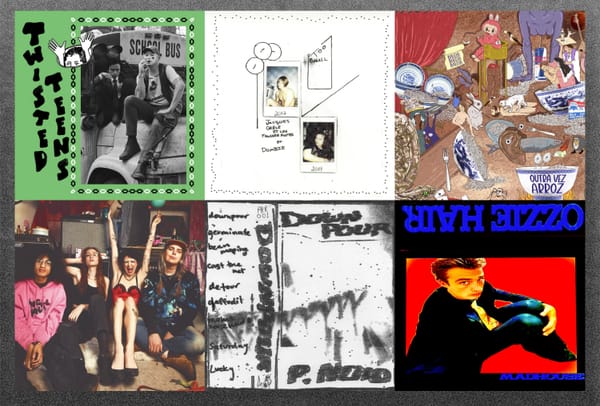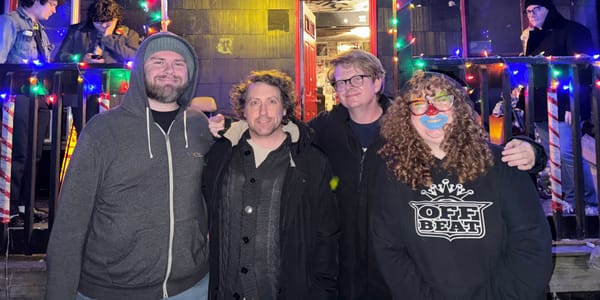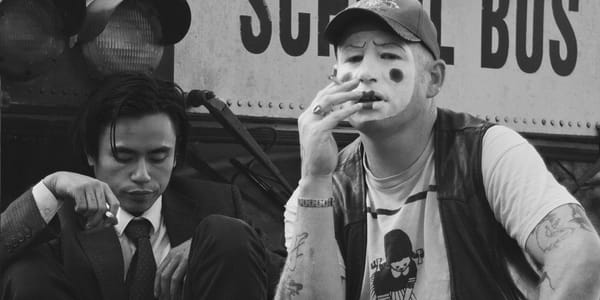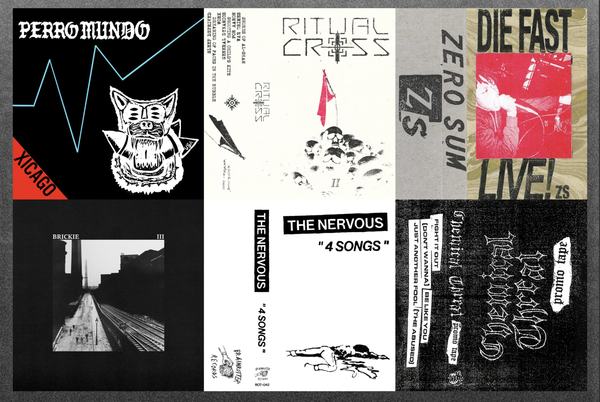day residue are frustrated + meticulous punks from detroit
Cree Cree and Aleahia Thompson formed one of the city’s best new bands. They discuss how they’re motivated by their own impatience and the unceasing global flood of bullshit.
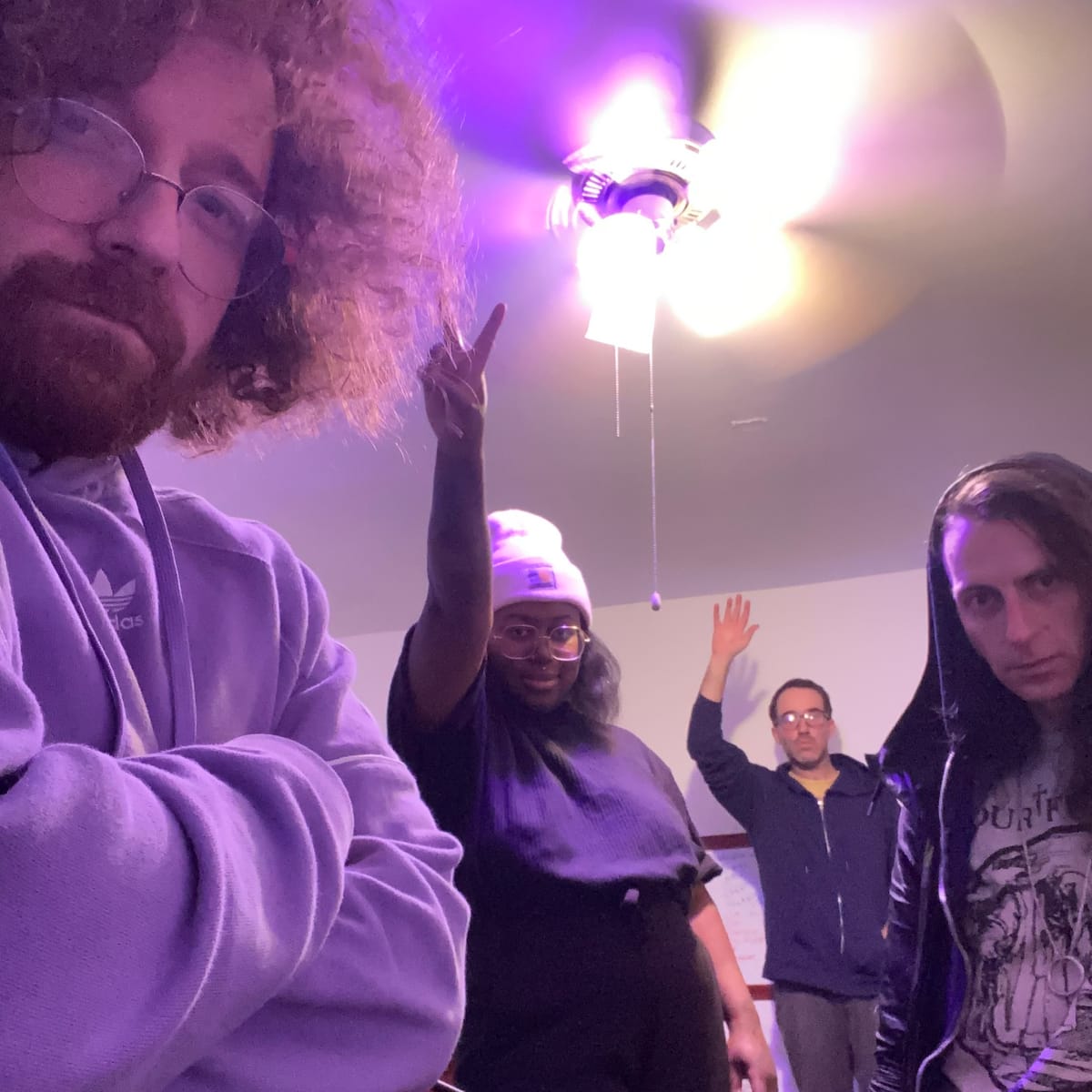
Day Residue make bristly punk driven by feelings of dissatisfaction and daily existential horrors, their chaotic sounds blueprinted in exacting measure. This has been more or less the Detroit band’s design since it started in late 2020 as a deep pandemic recording project between friends Cree Cree and Aleahia Thompson.
At that point Cree Cree (sometimes known as Chris Campbell) had been active in Detroit’s circles of caustic and experimental rock bands for a while at that point, notably with Terrible Twos and sometimes a participant in the Johnny Ill Band, Timmy’s Organism, and occasionally doing shows with an exceptionally good solo synth project. Thompson was brand new to music, but jumped all the way in anyway, starting two separate two-piece punk projects within days of each other.
Dazed all-night demo sessions organically grew into a full-on band, the lineup rounded out by Isaac Fink and Ryan Clancy. They sharpened as they grew but kept the oblong weirdness of the band’s beginnings at their core. I spoke to Day Residue’s co-founders about their origins and creative process, and how they’re motivated by impatience and pushing back against the barrage of terror.
How and when did the band get started?
AT: December of 2020 was our first practice. I kept asking [Cree Cree] to be in my all-girl punk band. My other band Rough Patch and Day Residue started a week apart, so that band’s first practice happened and then Day Residue started getting together to work on demos.
CC: We also lived a block away from each other. It was a good time to go through the growing pains of starting a new band. This is 2020, we were neighbors, and we literally had nothing to do. We were in each other’s COVID bubble.
So wait, did you ask Cree Cree to join Rough Patch at first?
AT: No, I wanted an all-girl punk band basically since I was a kid, and obviously he [not a girl] isn’t gonna be part of an all-girl punk band. I knew I was going to start these two different things and they were always going to be separate. Rough Patch was different and it was really nice for me to have those different connections. It was like the two of us will do one thing, and me and Anne will do something else.
Did Day Residue start out as a duo as well?
CC: Yes, for the first year probably.
AT: The first drummer joined in April [2021].
CC: The impetus began with Aleahia and I recording with drum machine, four-track, sometimes an iPad or a phone. We both kind of played and programmed whatever. We went through a lot of songs in the beginning. There’s only one song from that original batch that we still play, the first song we ever wrote, “Company Man.” We tried a bunch of weird shit and would record for hours. So it started like that. At that time, though, we felt like what’s the point of getting together a full band when there are no shows happening. And also, we wanted to make sure we were doing it right. We were learning a lot at the time.
Aleahia, were these your first bands?
AT: Yeah.
But Cree Cree, you’ve been in a lot of bands over the years.
CC: Towards the end of Terrible Twos, a band I was involved with for a long time, I was pretty burned out on the guitar. I felt like I didn’t really know how to do something interesting to me or that didn’t sound like I'd already done it or someone else had done it. Basically I wasn’t feeling l attached to the instrument for the first time in my life. At some point I realized what was bothering me was that I couldn't do what I wanted to, what I was hearing. So I got really into the idea of being expressive on guitar. That started during COVID. I was just sitting around playing guitar all the time. That happened to coincide with me moving a block away from Aleahia, so the timing was kind of perfect. It was like “I’m excited about playing guitar again. You want to start a punk band with me? Let’s go.”
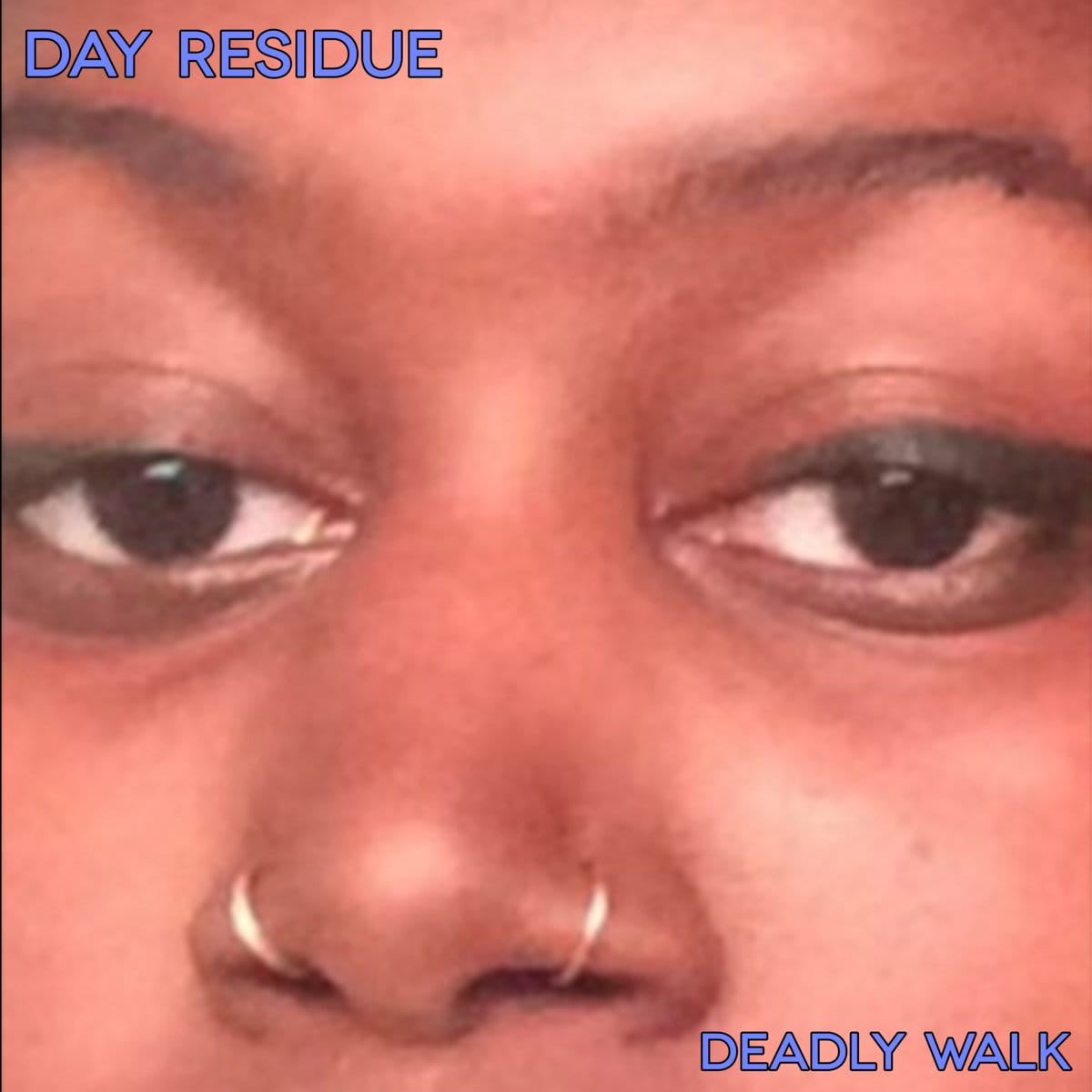
Had you two been friends before?
CC: Yeah, we were already hanging out and partying or whatever. We talked a few times about playing music and then it was like, okay, there's literally nothing to do. We’d better do this.
Where does the name come from?
CC: The name Day Residue came from a book about dreams I saw at someone’s house years ago and mentally noted that would make a cool band name. It describes when content from your day ends up in your dreams later that night.
Tell me about the transition from hanging out and jamming for hours to putting together a live band. How long were you in that beginning phase before it became a full group?
CC: We never jammed. Ever.
AT: We basically both had a bunch of songs ready. Like our own demos.
CC: In the recording process we would just add additional layers to each other’s songs. It was never like we would jam until it became a song. It was more like “This is how it goes, okay let’s record the drum thing. Bam.” There was a lot of recording and arranging at the same time. I thought it was really important to get everything done quickly rather than waiting for the magic to happen. [All laugh] Kind of like, okay, you have an idea. Let’s expand on that.
Hyperproductivity.
CC: Yeah. Both of us are pretty impatient, too.
AT: [enthusiastic agreement] Yeaaaaaahhh.
So when did it go from that collaborative writing and demoing to becoming a full band?
AT: It wasn’t super long at all.
CC: Our original drummer Scott Dunkerley, from the Frustrations, Timmy’s Organism, etc. We did a few practices with him when he had just moved back to Michigan. It was cool timing because he wasn’t in a super active band at that point.
AT: Isaac joined a few months after Scott.
CC: I felt like it was super important that we liked being around the people we were in a band with. Isaac was one of the few people I knew who was hip to certain punk stuff, and just an awesome person to hang out with, so I asked him. I had to kind of pull his arm a little bit.
AT: He was nervous about playing guitar, right?
CC: I had assumed he was a guitar player, but he was actually a bass player.
AT: That was like a half a year after we started recording. Those two joined in April, or May of 2021 and we played our first show in November of that year.
CC: So it was like six months of demoing and then Isaac and Scott joined. Over time it’s become like Aleahia and I write and record a demo and then bring it to the band.
AT: We’ve tried other ways, too.
CC: There have been some happy accidents, but generally it’s like, “Here’s the song, let’s learn it.” Sometimes writing other people’s parts, sometimes not.
AT: I think it’s easier that way, and it’s faster that way. As an impatient person. [laughs]
The creative core is you two, individually? Do you always write separately?
AT: Sometimes we write together.
CC: We do both, separate, together. No matter what, we’re always changing each other’s songs a little bit. When she sends something to me, it’s usually an additive thing where I’m adding things. If I send something to Aleahia, it’s the reverse, where she’s cutting things out. I tend to have too many ideas and with her stuff..
AT: I’m a simple bitch. [laughs]
CC: I’m always trying to make [her songs] a little bit longer.
You just finished some of your first tours.
CC: We’ve done a couple of short tours. Like weekenders or week-long tours. We intend on doing more.
How’d they go?
CC: Great! It was Aleahia’s first time doing it.
AT: Yeah, first time touring at all.
What were some highs or lows from the experience?
AT: We went to Cleveland Art Museum and that was sick. I had a great time. The low was the first tour when our car was scraping and I had to go to an auto repair place early as fuck in the morning and spend all day doing that until we had to go on the road to the next show.
Classic.
AT: Yeah. That was really rough.
You have a couple of tape releases out already. Are you working on a full length?
CC: So that's what we were working on today.
AT: That's why we were late, sorry! We were recording. [laughs]
Is it still decidedly self-contained? Still recording yourselves?
AT: Vocally wise.
CC: The first two EPs that came out were a full-band production thing where everyone kind of was chipping in their input on the recording but we did it all ourselves. This time it’s a little more confusing. We recorded some of the music, and a friend of Isaac’s has been engineering, and then Cam Frank’s going to help us finish the instrumentals for the last four songs. Aleahia and I are recording our own vocals. The idea was to spend a lot of time on the vocals and not feel like we’re on the clock.
AT: Comfortable.
CC: Cause we don’t care what each other thinks.
So it sounds like you have help but it’s still an internal affair.
CC: Yes.
A patchwork recording that still keeps the control issues front and center?
CC: Yes, definitely. I have a lot of those.
AT: I just can't perform well if I'm uncomfortable in any way. I've tried to work with it and I realized for me to not hate everything, I have to create the environment that will help me. Because I just shut down.
CC: I also feel like…you know that point when you're recording and you get to the loopy point where you feel crazy? That’s when we hit our magic points: When we’ve been doing it for too long. We’ve definitely had a lot of times when it’s been seven in the morning, and we’ve been smoking weed and recording all night and that’s when we make something we end up being really proud of.
AT: Slaphappy tracks.
CC: So the goal is to do our own vocals so we can get to that point on our own.

Detroit’s scenes are pretty divided. The impression I’ve always gotten is that the Detroit punk scene is pretty separate from the scene of folks who are associated more with playing garage rock or noise or whatever else without too much overlap. What other bands do you feel are part of the present-day Detroit punk movement?
CC: I think we're an interesting band in that sense, though, because the two of us have been kind of a fixture about town in a way that crosses over various music genres, like whether we're working at a show, we're playing an event, whatever it may be. Because of that social overlap we find ourselves on these shows that are kind of strange where we're playing in between like a techno DJ and a band like Double Winter or something. Because we intersect with a lot of crowds, we sometimes are the token punk band in some ways.
Do you ever find yourself in a show where you're like: “Fuck, I don't know any of these people. All these bands are crazy punk bands from Detroit.”
CC: Well, I found us playing shows where I don't know people, which is awesome, which is the goal really. We’ve definitely been playing more shows that are like, total punk shows. Bands like Werewolf Jones, 208, Fen Fen, Womb Worm.
AT: Morbid Cunt. When I hear the question “who are the punk bands right now” I read that as like, what are some aggro bands, cause that’s normally what I’m looking for and I don’t really find it a lot. I’m wondering also! Maybe I’m biased because I’m emotionally off-kilter all the time and I’m always looking for something crazy sounding.
CC: I have a hard time with genres and do my best not to think of music in those terms.
AT: I also do. There's a lot of just fun bands. Party bands.
CC: That's a good point. I do sometimes feel like we're out on an island. We do come off a little more serious, I feel like.
Are the songs serious? Is there an element of political energy to them?
AT: Yeah, I would say it's unavoidable. Personally, when I'm writing, I'm reflecting on everything that's upsetting me. My primary recurring theme is being upset with dealing with horrific shit nonstop. Like a barrage of terror all the time and you're expected to just act like nothing is happening and just continue not only to exist and function, but to act like you're happy about it. Like the amount of people who are weirded out when I'm like, “Oh, I'm OK.” And they're like, “Just OK?” You fucking better be glad I didn't say I'm feeling terrible. Are you kidding me? It's just that. It's the show of things, like putting on a face, which is unnecessary and insulting. And that spans a lot of different things, like the way everything is functioning. Why were people working during a fucking pandemic? Why did they feel forced to? Why don't businesses shut down in support of Palestine? Why is work more important than people’s wellbeing? It's hard that there’s such a pushback to even express that you are upset with something. People think it's wrong to tell the truth.
CC: We’re also poking fun at our community in a way. Like maybe the flip side of things is like people fighting for the wrong things and pretending to be righteous about things that don't actually matter. Like poking fun of that, but also saying what's happening in the bigger picture is garbage. But also that the way people are dealing with it may be stupid.
AT: There's a lack of care about like so many things, and I just – I can't avoid complaining about it. It's upsetting. At my job as a bartender, it's constantly in my face; pretend, pretend.
You get paid to make terrible people feel like they're not terrible.
AT: Yeah. [laughs] I'm there to remind them that things are bad still. Hope you're having fun though! Enjoy your night. [laughs]
Fred Thomas just released his new album Window in the Rhythm. Go check it out.
see/saw is a reader-supported publication. If you enjoyed this article, please consider a subscription to support this independent punk journalism operation.

